Student Blog
Life Hacks
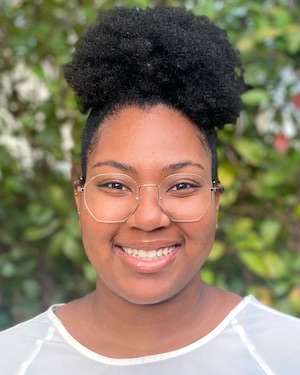
The ABCs and 123s of NBCOT Prep ⟩
November 24, 2021, by Kayla
Classes Life Hacks
The NBCOT, the certification exam that solidifies new graduates as a ~real~ OT. For most, this is the last big exam in your academic career and a reminder of just how far you have come; quite literally everything has led you to this point.
So, let’s get right into it; as with many things in life, there is bad news and good news. Bad news first, studying is going to be stressful and require discipline and dedication; but the good news, you are NOT alone and it won’t last forever. During the process of studying I eventually gathered the sense that the NBCOT is like a rite of passage; not only because every OT has to take it, but because everyone remembers that unique time and the experience of it all. Everyone you speak to is going to have study tips and advice to give you . . . so it would only be right to pass unto you the wisdom that was imparted on me. Without further ado, I give you, the NBCOT ABCs and 123s.
ABCs
N — Nail Down a Study Schedule
One of the first things you’ll want to do is create a study schedule, including determining how long you want to study overall and how many hours per day/week. The next step I took was to determine my study schedule and luckily for me (and you) there are many readily available online. I chose not to reinvent the wheel and use a pre-existing study guide because that worked for me, but creating your own is also an option. This step is all about formulating a study schedule that meets your needs and makes sense to you!
B — Build Endurance
This exam is four, count them, four hours long. A huge component to success is training your body and mind to be able to tolerate sitting in a chair and more importantly focusing and thinking clearly for that long. One of the best ways to do this is to gradually increase the amount of time you are in complete focus/study mode. Consistency is key in building test endurance.
C — Choose Exam Materials That Fit Your Learning Style
There are so many study materials out there and so many different opinions on the usefulness, but ultimately what really matters is how they fit with your unique style of learning. Below I’ve listed some commonly used study materials and a little bit about them.
AOTA Exam Prep: This resource consists of practice questions, practice tests, informational PDFs, and flash cards on virtually every practice area and study topic. This resource also provides rationale for the correct answers to questions, I personally found this very helpful! The price of these materials is $149 for AOTA members and $209 for non-members. (Pro-Tip: USC professors normally send out an email to get a reduced group rate on this resource so be on the lookout for that when the time comes around!)
NBCOT Study Pack: This resource has a pre-test, domain-specific questions, mini tests, flash cards, and study games to help you along the way. The most valuable components to me were the practice test and the full practice exam. The consensus among my classmates was that this resource was most useful for getting the feel of how questions would be asked and the format of the exam. There is also a myth that you are likely to score within 10 points (more or less) than your score on the full practice exam; my score proved the myth right in my experience! This resource is $75.
OT Miri: On top of this being a completely free resource, it is so useful! The videos are a great way to learn or solidify the information you’re studying. Personally, I absolutely LOVE OT Miri, she’s so relatable, covers a wide range of study topics, and presents information in a way that’s easy to understand and easy to remember. I’ll be singing the Finkelstein Test song for a long long time (IYKYK).
OT ExamPrepper Podcast: This is another free resource, this podcast is dedicated to helping students like us succeed on the board exam. The host explains study topics using pop culture references and creates clever mnemonics to help you remember information. There are even visual and study guides to refer to while listening to the podcasts; they’re great to listen to during a workout or on your daily commute!
TherapyEd: The TherapyEd book often gets a bad reputation because it is dense and has a lot of information. This is a very comprehensive resource that covers a lot of content and specifics within each study topic. I found the corresponding online questions and practice exams so useful because rationale for the correct answer is provided.
I started using mine about a week before my exam and I was so upset I didn’t use it sooner, the questions and rationale SO useful for my learning style.
O — Optimize Your Study Space
Here are some pointers to optimize and organize your study space/time!
- Use the do not disturb/silent feature on your devices to decrease distractions
- Find a quiet and comfortable place to set up your study headquarters
- Have water and snacks nearby
- Take meaningful breaks when needed
- Study at the optimal time for you (I’m a night owl!)
- Switch it up every once in a while (I did this by zoom studying with a friend!)
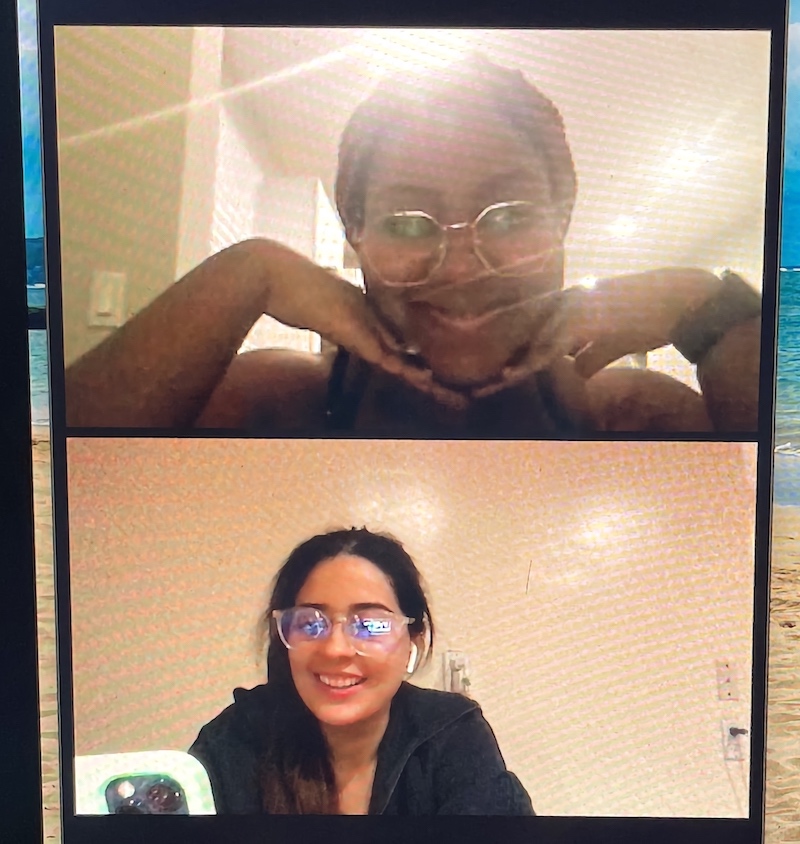
My friend Kim and I on a Zoom study break!
T — Take Practice Tests
Taking practice tests is SO useful because it combines all of the skills you need to be successful on the actual exam. They help build endurance, help determine how long you take to complete the exam, and illuminate areas for you to focus on during your studies!
123s
Another huge component of NBCOT prep is making sure that you are taking care of yourself so that you have the energy and mental capacity to study! This is more easily said than done but hopefully these tips will help.
1 — Listen to Your Mind and Body
Honestly, some days are going to be better than others. Some days you are going to be studying and really understanding the material and motivated to keep going. Other days, you may be tired, overwhelmed or busy with other things, or just not have the energy to study. And guess what, that’s OKAY! The process of studying for this exam is just that, a process, and the results will be a culmination of the effort you put into your preparation. That means, if one day you feel like you just cannot focus or are too exhausted to study, give yourself some grace and rearrange your study schedule. I promise it is 100% better than trying to push through and burning yourself out. Extra Tip: schedule rest days into your study schedule! It can help ease the apprehension that can come with taking a day off!
2 — Do Your Self Care!
This counts for during your studying as well as before the exam. This is a great time to practice what we preach, take time to do the small things that make you happy and the things that make you feel like your most authentic self. It is easy to assume the identity of “studying for the NBCOT” and let that and the stress consume us (guilty as charged) but it doesn’t have to be that way.
Extra-Extra Tip: The day before your exam, don’t touch any of your study materials and schedule some R&R activities for yourself. Spend some time with family or friends, grab your favorite latte, just do things that make you feel good. I promise, your brain and body will thank you.
3 — Affirm and Reaffirm Yourself . . . and Reaffirm Yourself Again!
Mindset is EVERYTHING and this starts way before test day. While you are studying it is easy to get down on yourself or doubt your abilities but it is important to reaffirm yourself that you can do this! Positive self-talk and reframing how you’re feeling will go miles farther than putting yourself down; it could even be the extra edge that helps you pass.
⋯
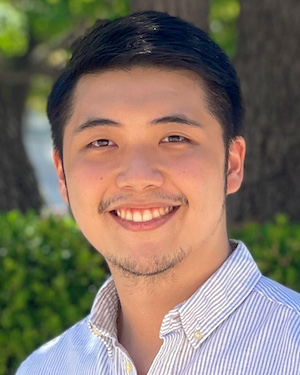
Things I Learned from Falling Down ⟩
November 16, 2021, by Marvyn
Life Hacks
Remember my very first blog post when I said my OT journey wasn’t cookie cutter? Click here if you haven’t read it yet. I had a lot of setbacks before I became an occupational therapist back in my home country, the Philippines. But as many people would say, nothing worth having comes easy. It is really those setbacks, that led me to be who I am today. Here are just a couple of things I learned from these setbacks.
#1, Everything happens for a reason.
Setbacks suck. You planned to achieve your goal and worked so hard, only to have it crash down and fail. So now, you feel disappointed in yourself for letting this happen. You feel like you failed a lot of people’s expectations. You then go down a slippery slope that sets you up on a dangerous snowball of hurt. I remember being in that snowball many times, and the crash landing hurt the most.
I think there is a sense of calm in understanding that some things, whether good or bad, MUST happen for your personal growth. I mean, who wants to watch a movie without conflict? I remember when I was struggling and eventually failed to meet my undergraduate professor’s expectations, I did nothing but blame myself for it. But later when I realized that this needed to happen, I understood that had there been no setback, there was no room for growth and improvement. Now that I know the feeling of disappointment, I did everything I could to not experience it again.
#2, It’s useless worrying about things you cannot control.
“Oh no, my plans failed! My life is over!” You start worrying about what comes next. You think relentlessly about the problems you will face. You start panicking because you have no backup plans and have no idea what to do. To some extent, you even start to contemplate giving up on your goal.
I am the type of person that plans out what I want to do in my life. But when life plans do not go the way as planned, I used to panic and worry about things that haven’t even happened yet. It’s like dodging a rock without anything being thrown at you. I just ended up being very tired. Instead, I found that learning the art of “letting go” lifts the weight off my chest. Now while I reflect on my mistakes, I learned that in failing to meet my undergraduate professor’s expectations, I am unable to influence what others will think of me. I am also unable to change what I did because what’s done is done! So instead of worrying about anything and everything, I started thinking about the small things I need to do to improve, like tweaking my schedule to fit the demands, calculating small steps to take to get back up.
#3, Revenge is so sweet.
And by revenge, I meant I developed a strong internal motivation to become stronger, more resilient. I always tell my friends that a small setback is only setting you up for a major comeback. When I found out my life didn’t go the way as planned, I took that as an opportunity to grow. Like in any movie, the protagonist fails and experiences hardships, but they always find ways to come back stronger. The internal flame that burned inside was my motivator to stand back up and to keep fighting for my goals. I took all the necessary steps to be better than I was, and I was determined to not repeat the same mistakes. I made sure I prioritized self-love and focused on strengthening my personal relationships as well.
Overcoming these setbacks is the best type of revenge you can make. The feeling of “Nothing is going to stop me now!” is exhilarating, most especially if you start succeeding in achieving your goals! It’s like winning an arcade boss fight after losing over and over again. After your self-reflection, growth, and improvements, you can see yourself fighting back much stronger than you had before.
Every superhero has an origin story. And it seems like failure must be a major prerequisite to become one. After countless setbacks and continuous life tweaks, you would think I would gain a sense of tolerance, but quite frankly life doesn’t work that way. I’m not here to say, “There there. It’s okay.” Instead, I’m here to remind you that although things could and will get rough, never lose sight of your goals in life. Had I not experienced what I have had in my past, I wouldn’t have been able to be where I am today: achieving my dreams here at USC. My OT journey is definitely not a linear path, but I learned to be grateful for every experience I am getting, all the good and bad. After some time when you look back at where you have been and gone through, you’d be proud of how far you’ve gone and what you have accomplished. Keep at it, you superhero, and always Fight On!
⋯
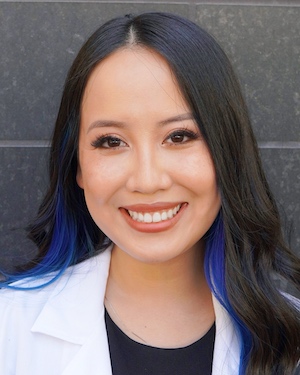
The Giving T(e)ree(sa) ⟩
October 25, 2021, by Teresa
Classes Life Hacks What are OS/OT?
Heyyy, besties! So the moment we enter Q4 on October 1, I start thinking about giving season because not to brag, buuut . . . I take a lot of pride in that (I believe) I give fantastic gifts. Whether big or small, I always try to make sure my gifts show people I was really listening to them when they shared with me that they’ve been wanting “X” or are really into “Y.” My top love languages are “quality time” and “physical touch” so you can imagine how much ya’ girl struggled throughout the pandemic, I’m not going to lie. But “gifts” became a welcome . . . well, gift.
In OT 405: “Foundations of Occupation” last summer with Dr. Halle, we learned that occupational therapy is rooted in the Arts and Crafts Movement but that our OT-founding queen pointed out that “handiwork alone was insufficient” (Slagle, 1930, p. 271). Then in the 1961 Eleanor Clarke Slagle Lecture, Dr. Mary Reilly shared the famous quote, “[Wo]Man through the use of [her] hands as they are energized by mind and will, can influence the state of [her] own health” (Reilly, 1963, p. 2). I know, I know — what is this, another lecture? But these things really stuck with me because it gave a definition to the calmness and serenity I had felt my entire life when crafting.
Over the past year, one of my favorite occupations has quickly become making things with my Cricut and I just feel the need to clear the air because whenever I say this, people are like “. . . 🦗???” Okay, NO — it’s a machine that can make intricate cuts on paper, cardstock, vinyl, etc., and allows you to make your own personalized crafts.
It just so happens that in OT 405 last summer, I was placed in the same group with Alyssa Matlosz, who’d become my fellow student ambassador and more importantly, one of my closest friends in the program. She was the first facilitator for our group and in relation to her week’s topic of Progressive Era Influences on the founding of occupational therapy, she ended with “I’m just like my country — I’m young, scrappy, and hungry — and I’m not throwin’ away my shot” and I thought . . . Did we just become best friends?
So it only made sense that on her birthday this year, after a year’s worth of iconic Zoom moments . . .
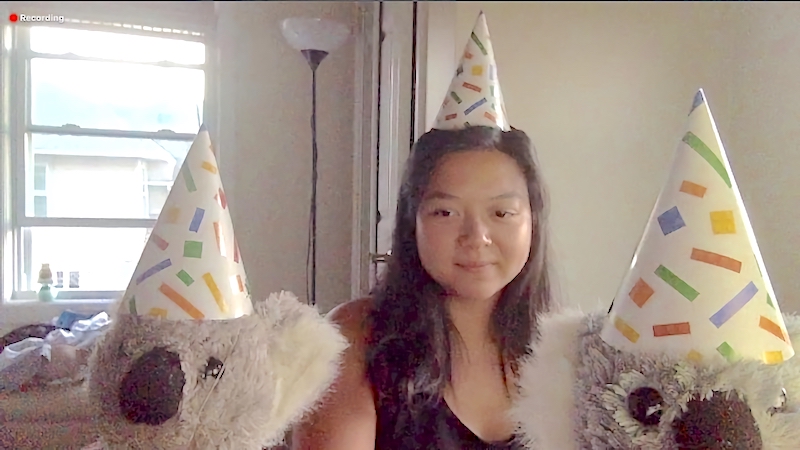
I truly do not even know how to begin to explain this, so please take it for what it is
. . . That I’d circle back to OT 405 and our shared love of “Hamilton: An American Musical” — a nod to the foundations of our friendship.

The designs I created on the Cricut Design Space app

I selected the vinyl material I wanted to use, I arranged it to the cutting mat, I arranged it into the Cricut. (I arranged the menu, the venue, the seating!)

Left: This process is called “weeding,” where you extract the cut by removing the excess vinyl. Right: The finished vinyl cuts ready to be transferred onto the surface I choose using transfer tape!

Left: Honestly, I’m pretty proud of this. Please, no one ever throw away their (sh)OT. Right: Lights are overrated, there should be a koala at the end of every tunnel.
I made these gifts during a week that, truthfully, I did not have time for. In between assignments, exams, deadlines, and applications, I was feeling overwhelmed and to be completely honest, I couldn’t remember the last time I had done something unrelated to school. So instead, I took a break and powered up the old ‘Cut. Something I really enjoy about the therapeutic process of crafting is that not too long ago, you just had a concept you were brainstorming in your head and now it’s a tangible, real thing you brought to life. I’m not just talking about physical items you create with your hands, either. You can “craft” anything — an essay you wrote last week that you’re really proud of, a flyer you made online to promote an event, a photo you captured to add to your carefully curated Instagram post, a blog you’re writing about what everyone initially thought was your love for insects. You took an abstract idea and introduced it into the world and if your mind can do that, think of all the things you’re going to do in the future. What a wonderful gift for this world to look forward to — the promise and hope of the products of your creativity and ingenuity that are yet to come.
There is also something beautiful to be said about an item you make with your hands. I spent hours on this gift, but each moment was such a mindful experience. How could you not say crafting falls under OT? From the fine motor skills it takes to handle tools and delicate material, to the executive functioning required to sequence tasks, to the visuoperceptive skills needed to locate and work with everything, to the social connectedness you feel in making the activity personalized . . . the list goes on and on. And then being able to give the end product to another person and in doing so, indirectly saying, “I made this for you because I care about you. But in making it, I was able to sit down and take time away from my stress, so even though I care about you . . . I care about me, too.”
Is there any gift greater than that?
I have the honor to be . . .
Your obedient servant,
T dot Pham
References
Reilly, M. (1963). The Eleanor Clarke Slagle: Occupational Therapy Can Be One of the Great Ideas of 20th Century Medicine. Canadian Journal of Occupational Therapy, 30(1), 5–19. https://doi.org/10.1177/000841746303000102
Slagle, E. C. (1930). Address to graduates. Occupational Therapy and Rehabilitation, 9, 271–276.
⋯
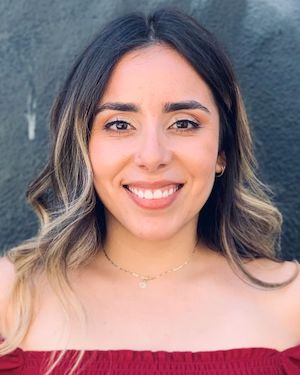
Survivin’ ~N~ Thrivin’ ⟩
October 21, 2021, by Silvia
Life Hacks School/Life Balance
Ok, full disclosure, I was not thriving last week . . . or the week before that.
Sometimes life is just hard, you know. You may have big assignments due, an application to submit, an exam (or two) to take, and work deadlines to meet — all while you’re trying to resolve family issues, your printer decides to stop working, your computer crashes, and your ex has the audacity to text you and ask how you’re doing. Two or three of these things I can handle, but all of them together felt a little excessive.
And here’s the thing about me, I do not handle being stressed or overwhelmed very well. My go-to coping strategy is to eat ice cream with under-baked cookies and watch Mulan, which is not exactly the answer I gave during my OTD interview — but that’s besides the point. What I am trying to say is that the first half of October was rough. I had so much going on that I felt like I was just doing and not being. Honestly, a lot of us felt that way (per the brief research I conducted, aka my “Surviving vs. Thriving” Instagram poll) and maybe you are feeling that way right now. If you are, I want to say this: there is more to life than this moment, let it go and let it be.
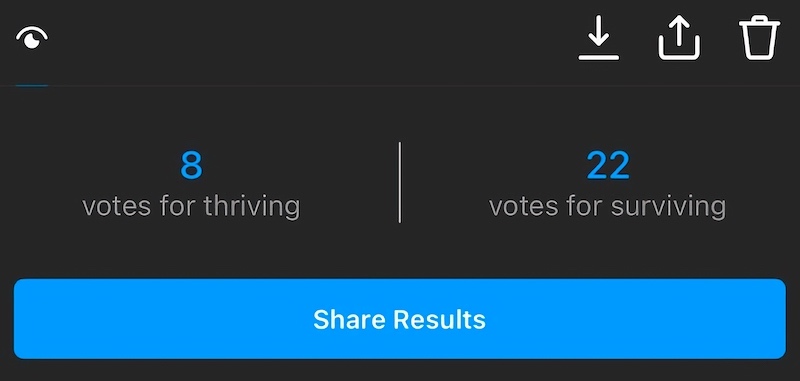
Data from my very (non) scientific research
Like many things, this is easier said than done, I know. It took me having a mini emotional and mental breakdown to finally give myself some grace. I don’t always have to have it all together, and neither do you, but I do think that we should always be kind to ourselves — and this is something I am working on. On the days where I feel defeated, I stop and tell myself that there is more to life than what I am feeling right now, I think about all the things that make me happy and give me life, and I give myself credit for how far I’ve come. I affirm myself.
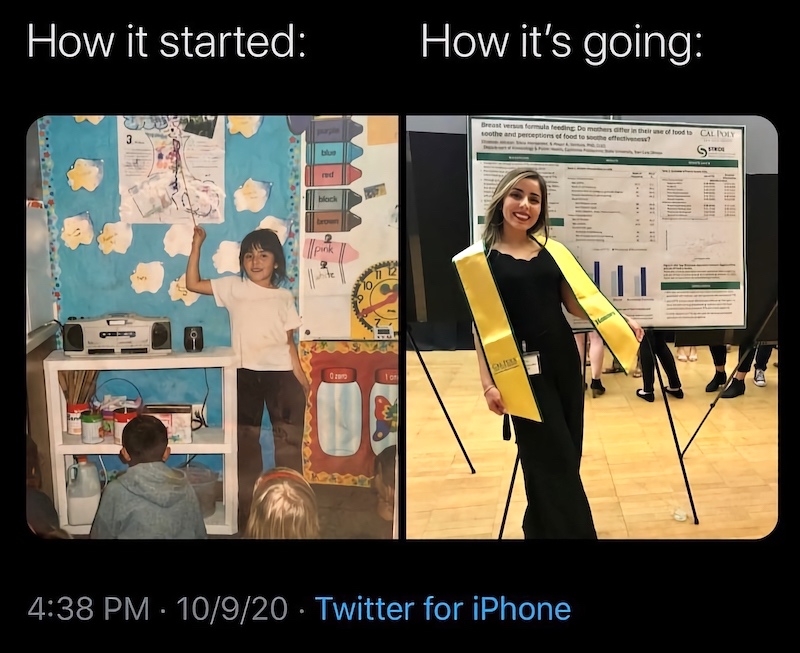
How it started vs. How it’s going . . .
When I do this, I realize that I truly am thriving. I am living in a new city, meeting beautiful people, making new friendships, halfway through the master’s program, and pursuing a doctorate (ok, this one is contingent on being accepted, but speak into existence ok).
Life is about perspectives, and how you choose to look at things may shift the way you view surviving and thriving.
⋯
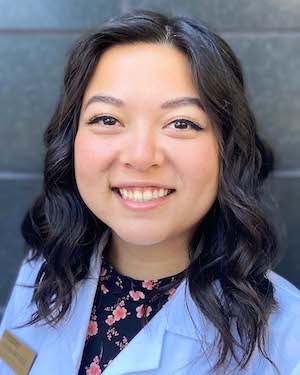
Hacking Houses into Homes ⟩
September 22, 2021, by Alyssa
Housing and Transportation Life Hacks Living in LA
Like a lot of people, I’ve spent most of my time over the past year and a half at home. In a series of events (some fortunate, others not so much), “home” for me has looked like a USC dorm, my childhood bedroom, and several short term apartments. Since March 2020, my living situation has been like a game of ping pong: LA → New Jersey (1 month) → Wisconsin (1 month) → New Jersey (2 months) → Connecticut (4 months) → LA (4 months) → Illinois (3 months) → LA (present).
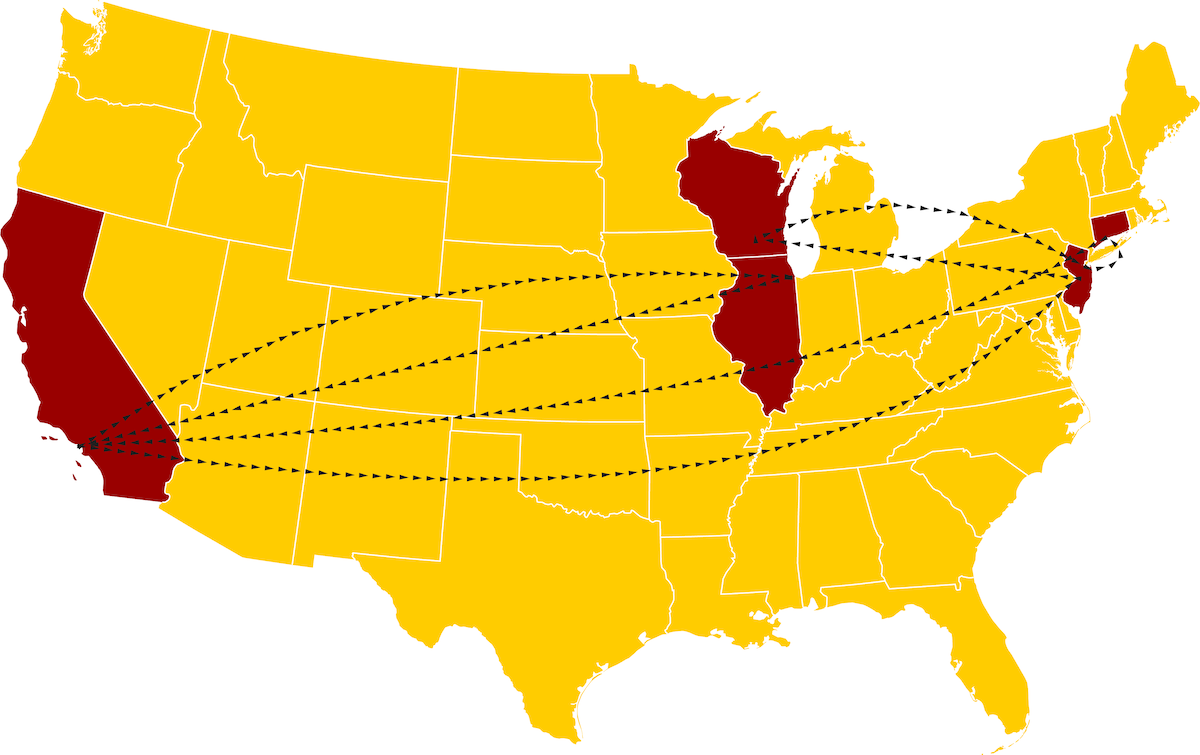
1.5 years of moving around
On top of hopping between states, I was constantly changing the spaces themselves. I can get obsessive over tetris-ing my things into a new space as logically as possible. I draw out floor plans and make models on the Sims. Then, I rearrange my house when I’m stressed (it is a hazard of living with me, any roommate of mine can attest). But what all of this moving, planning, and rearranging has taught me is that there’s no right or wrong answer for a living space — the best space is whatever works for the people living in it.
We’ve learned repeatedly in class that an environment that matches a person’s needs can support their ability to participate in occupations. If you’re considering changing your current setup, moving to LA for grad school, or trying out-of-area fieldwork in a new city — let’s talk tips for making your living environment into a home.
Locations for Leisure
Especially if you are working from home, it can be easy to forget that home is also a place for leisure. Think about how you can make space for leisure activities you like. This could be leaving floor space for a yoga mat, setting up a craft corner, or establishing a comfy space to read. For me, this means having a dedicated table to do puzzles.
Match Your Mess
Nobody’s perfect and sometimes our habits/routines are messy. Instead of shaming yourself for it, consider how your environment can support you. Here are 2 examples:
- If I don’t see something, it isn’t there. I keep my clothes easily visible stacked on bookshelves instead of hidden in drawers. In my fridge, leftovers are on the top shelf, the condiments are in the vegetable drawer, and all vegetables are in the door (this one has really saved me from wasting food).
- Part of my daily routine is trying on no less than 4 outfits before I pick one and then I either run out of time or, honestly, don’t prioritize putting them back. This used to result in a disaster zone in my bedroom and confusion between what clothes were dirty vs clean. My solution now is to have a separate basket for clothes-to-put-back-later that I can reorganize when I have time.
While these might make no sense to you, my point is that there are no rules. Match your home to your habits/routines.
Furniture is Fluid
I’ve gotten almost all of my furniture second-hand and a lot of it is not used for its intended purpose. I’ve used an IKEA dining table as a desk. We used to keep pots/pans in the TV stand. My current fruit shelf was formerly my plant stand and is actually just a bathroom rack I found on the curb. Especially if you’re moving around and feeling like arranging furniture is like fitting a circle block into a triangle hole: everything is multi-purpose if you believe it is.
DIY Decor
Filling your space with decorations that make you feel good can seem expensive. Channel your creative energy and consider making some DIY Decor (throwback to Foundations: Creativity, Craft and Activity Analysis). It doesn’t have to be fancy - here’s some of what I’ve made:
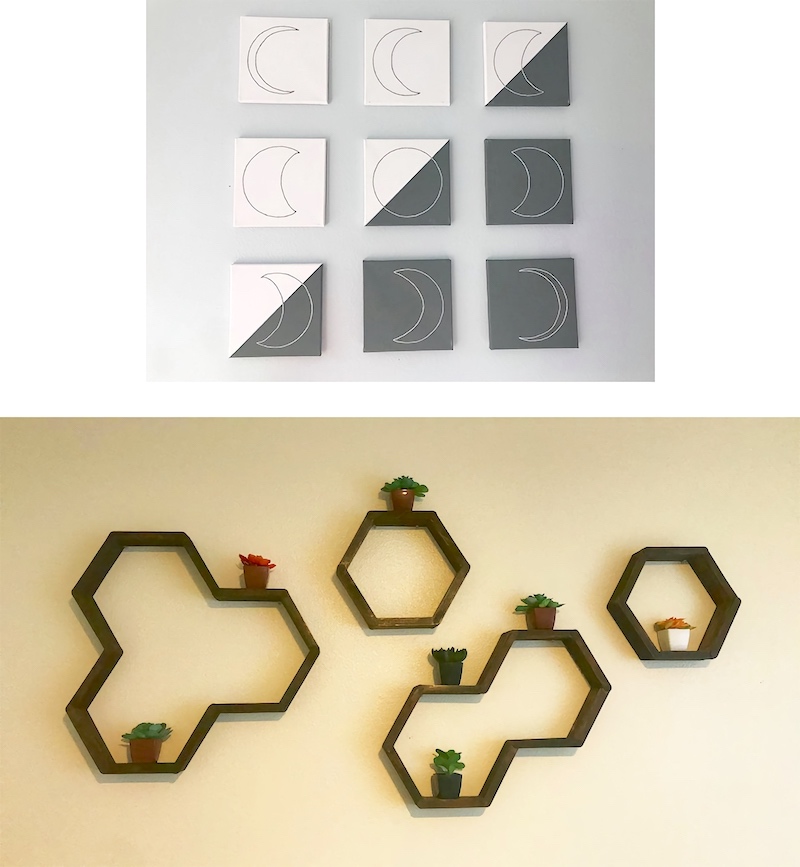
Embroidered/painted moon grid + popsicle stick shelves. All materials are from Amazon or the dollar store.
Writing this felt a little like skipping ahead. Actually finding housing, furniture, roommates, etc. is a whole other ball game — but I’ll save that for another blog post. 😊
⋯





